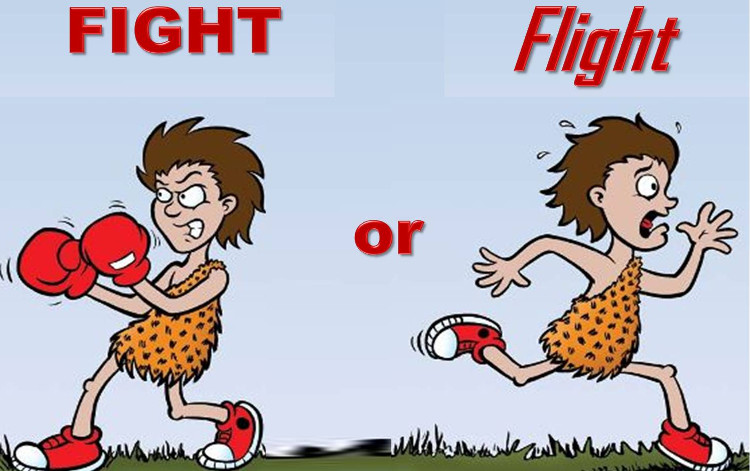Why do our hearts beat fast when we see danger?
Imagine you're walking on a dark road late at night after a fun evening with friends. Darkness surrounded, only the wind blowing through the trees, the sound of a discarded glass jar of people walking or heavy footsteps .
You look around frantically, and suddenly feel like someone is following. You stand, listen to the sounds, and feel your heart fly out of your chest, beat fast and have trouble breathing, .
So why did our heart suddenly beat in these situations? We will explain this phenomenon from a scientific perspective through the ScienceABC translation.

People have pretty good reflexes, but some things we let instinct handle itself.
Short answer: Due to flight-or-fight reactions of the human body and . Epinephrine.
The body's secret defense mechanism
People have pretty good reflexes, but some of us let our instincts handle themselves, such as protecting our bodies from danger. Whenever we feel threatened, scared, worried or panic, our bodies will switch to "fight or flight" mode. This name relates to the evolutionary history of mankind.
More specifically, when prehistoric species go out hunting and gathering, they will face wild animals. At that time, they had two choices - fighting or running. If it was a pig, they would stop and fight, hoping to win and give themselves a worthwhile meal. But if it's a bear / tiger / leopard, the wiser choice would be to run away .
Although the two options are very different, they all require the same things from the body - the energy explosion. Physiological changes that make up this reaction start with the secretion of adrenaline , triggered by brain warnings about something dangerous or impending stress.

More specifically, the amygdala handles the sources of sensation in the body (such as trash, bottles, footsteps, human figure, .) and an emotional response. If the reaction is fear or awareness of the danger, the amygdala sends a signal to the hypothalamus.
The hypothalamus is an important area of the body's physiological response because it regulates the autonomic nervous system, which includes sympathetic and sympathetic nervous systems. The sympathetic nervous system is where the "hitting or avoiding" reactions originate, triggered by dangerous emotional awareness. The hypothalamus will then signal the adrenal glands to release Epinephrine (Adrenaline) into the blood.
When Adrenaline enters the bloodstream, it causes rapid and dramatic physiological changes, including heavy breathing, flexible hands, high blood pressure, and . faster heartbeat. These changes not only stop there, you will also have small air ducts opened in your lungs to ensure enough oxygen is available for the stress ahead. When your brain receives an oxygen explosion, you become alert and aware. Hearing, vision and other senses become sharp.
Your heart beats faster, not only pushes blood around, but also redirects Glucose in the body, providing energy that can be used for muscles and organ systems. The flow of blood sugar is also caused by Epinephrine. Fats and sugars also make the bronchi more open, leading to increased heart rate.

Your heart beats faster, not only pushes blood around, but also redirects Glucose in your body.
Some other side effects of the "beat or avoid" reaction are not very pleasant. For example, dry mouth, sweating, tension in shoulders, headache, dizziness, difficulty breathing, .
These are the inevitable symptoms of other effects caused by Epinephrine on the body. In other words, we will feel uncomfortable and anxious. In many cases, the secretion of Adrenaline and the physiological responses of the body happen so quickly that we don't even realize we are in danger. Fortunately, a few million years of evolution have given us great instinctive reactions.
The dark side of Aderenaline
While the heart racing to pump energy to the feet when we are in danger is really a good thing, but long-term exposure to anxiety can be very harmful to the body.Chronic stress and anxiety can have the same effect as avoiding a car accident in a narrow distance or running away from an aggressive crocodile. It can lead to exhaustion, confusion, oxidative imbalance in the body, chronic disease and a significant reduction in the quality of life.

Some things you can do to help include deep breathing, meditation, relaxation, yoga and mild cardiovascular exercises.
While "hitting or avoiding" reactions can save your life, if your body falls into this state too often, it can shorten life. The other half of the autonomic nervous system, parasympathetic nervous system, is responsible for pulling us back from the panic of the "beat or avoid" reaction by reducing stress hormone levels as we play. appears that danger has passed.
However, this system can work too hard, and stop working. Some things you can do to help include deep breathing, meditation, relaxation, yoga and mild cardiovascular exercises. These techniques will ensure that the body's automatic responses are used properly, and are not abused.
The next time I feel the heart starts pounding, maybe not in a heart attack, sense senses have discovered that there is danger around. Check out the situation, embrace the surge of energy in the blood and make the choice that has been available for thousands of generations . fighting or fleeing?
- 10 years living with two hearts in the chest
- 8 harsh facts about fast food you ... should know
- Discover shocking animal hearts
- 6 animals that possess the heart
- If not protecting the environment, not many creatures are 'mutated' like this
- Video: Beating eggs under the sea
- All information about BRT express bus
- Dance atoms create super-fast computing
- The 'vampire fish' has 4 hearts
- Successfully implanted artificial hearts for humans
- Why is hard to beat the flies?
- What you don't know about BRT super fast bus systems around the world
 Green tea cleans teeth better than mouthwash?
Green tea cleans teeth better than mouthwash? Death kiss: This is why you should not let anyone kiss your baby's lips
Death kiss: This is why you should not let anyone kiss your baby's lips What is salmonellosis?
What is salmonellosis? Caution should be exercised when using aloe vera through eating and drinking
Caution should be exercised when using aloe vera through eating and drinking